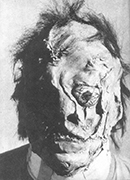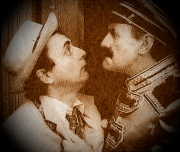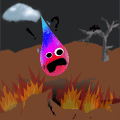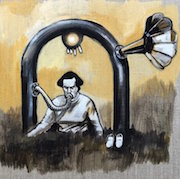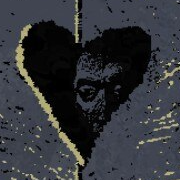|
What would be the recommendation for babby's first literary theory? Seems like Barthes comes up the most in those sort of discussions but I've never touched any writing on literary criticism so I have no frame of reference. Or for that matter, how do I go about... I don't know, appreciating literature better? That may be a dumb question, but I really enjoy reading and would probably enjoy engaging with it a little more actively. I think I'm lucky, by US standards, that I never really had a lit teacher that found a way to ruin reading for me by insisting on overly oppressive close-reading techniques or anything, so I don't have that bias hanging around in my back pocket. I've found that just slowing down and reflecting on what I'm reading and how I relate to it has enriched my reading experience but I'd be open to other ideas.
|
|
|
|
|

|
| # ? Jun 4, 2024 19:38 |
|
MockingQuantum posted:What would be the recommendation for babby's first literary theory? The Symposium of Plato.
|
|
|
|
mdemone posted:Along these lines and while talk of theory and art is in the air, Foucault's quick tour of Velazquez' "Las Meninas" (I think in the introduction to The Order of Things?) still stands out to me probably fifteen years after I've last read it. His powers of synthesis were what made him such an influence on my own theory, but I can sympathize with Mel's nitpick about that political kernel being always in his undercurrent. Personally my favorite Foucault is his analysis of the Panopticon Of course, the thing that always holds me back with Foucault is that he claimed AIDS was a social construct and then died of AIDS MockingQuantum posted:What would be the recommendation for babby's first literary theory? Seems like Barthes comes up the most in those sort of discussions but I've never touched any writing on literary criticism so I have no frame of reference. I always recommend Barthes' Mythologies to beginners. It bridges the Structuralists like Saussure with the future rise of the Post-Structuralists like Derrida and the Post-Modernists like Foucault. Plus I genuinely think he is the best actual writer of the critics and Mythologies is genuinely a really fun book separate from criticism. mdemone posted:but do you own more zizek books than me I am honestly not a very big fan of zizek which probably makes me an infidel in CD. If you are gonna talk about the social element of art I would rather read some Habermas. Mel Mudkiper fucked around with this message at 02:28 on Jun 8, 2018 |
|
|
fridge corn posted:do you suffer from ennui no not really, sorry
|
|
|
|
Mel Mudkiper posted:I always recommend Barthes' Mythologies to beginners. Cool, I'm interested to check it out, I really have no context for what I'm getting into.
|
|
|
|
|
MockingQuantum posted:Cool, I'm interested to check it out, I really have no context for what I'm getting into. Basically Mythologies is an examine of the loaded significance in everyday things. Its a good beginners course on signifiers and signification, and lets you see how Critical Theory opens up art and analysis to be far broader than the limited scope we conventionally see it applied. Plus, his article about Professional Wrestling as a form of Greek Tragedy owns. Check it out http://www.ngca.co.uk/docs/Barthes_WorldOfWrestling.pdf
|
|
|
|
MockingQuantum posted:What would be the recommendation for babby's first literary theory? Seems like Barthes comes up the most in those sort of discussions but I've never touched any writing on literary criticism so I have no frame of reference. Not really theory, but Francine Prose's Reading Like a Writer does a good job of showing how a lot of mechanics and methodologies in literature work. Could be a good "take the text on its own terms" counterpoint to theory reading. I have a small selection of theory books I have yet to read. And the best professor I ever had put out a fair number of books I should start grabbing, including the one my class was a dry run for. Someday.
|
|
|
|
What would the thread recommend for someone who loves Bernhard and is currently falling for Satantango (and planning for more Krasznahorkai after)? I assume I should be working my way towards Beckett and Kafka, but am looking for other stops along the way.
MystOpportunity fucked around with this message at 05:50 on Jun 8, 2018 |
|
|
|
MystOpportunity posted:What would the thread recommend for someone who loves Bernhard and is currently falling for Satantango (and planning for more Krasznahorkai after)? I assume I should be working my way towards Beckett and Kafka, but am looking for other stops along the way. I haven't read Satantango, but if you're reading and enjoying Bernhard, you're Beckett-adjacent anyway. Molloy isn't some storm-shrouded mountain in the distance like Finnegans Wake.
|
|
|
|
everyone should read the trilogy multiple times imo
|
|
|
|
Check out Ben Winters's "Last Policeman" books, which are about a cop trying to do his job while the Earth is six months away from being wiped out by a massive asteroid.
|
|
|
|
MystOpportunity posted:What would the thread recommend for someone who loves Bernhard and is currently falling for Satantango (and planning for more Krasznahorkai after)? I assume I should be working my way towards Beckett and Kafka, but am looking for other stops along the way. Just dive straight in, better to be puzzled than to be daunted. And Beckett is more accessible than people give him credit. MockingQuantum posted:What would be the recommendation for babby's first literary theory? Hate to add to the reading list but Plato's Phaedrus is pretty much the beginning of the conversation as far as what is rhetoric and what does it do goes. It's short, relatively easy to read and fun. The added bonus is that once you've read it your understanding of where Derrida is coming from increases tenfold and you wonder why people hate on him so much
|
|
|
|
MystOpportunity posted:What would the thread recommend for someone who loves Bernhard and is currently falling for Satantango (and planning for more Krasznahorkai after)? I assume I should be working my way towards Beckett and Kafka, but am looking for other stops along the way. you can't really build up to kafka, there's no literary tradition which will ease you into his insane fever dream of reality. just jump straight into the trial and then read some of his short stories and if you really like it read the castle and amerika. i don't think kafka is very difficult, just very good and very troubling.
|
|
|
Mel Mudkiper posted:
This is a good suggestion and all but, how about Terry Eagleton It's important for everyone to have a solid grounding in the importance of marxist criticism
|
|
|
|
|
MockingQuantum posted:What would be the recommendation for babby's first literary theory? Seems like Barthes comes up the most in those sort of discussions but I've never touched any writing on literary criticism so I have no frame of reference. terry eagleton's literary theory: an introduction is very good and will give you a good overview of the broad methods of literary analysis, even if he skews a lot of the philosophy towards his own (marxist, in the literary and not the political sense) perspective. derrida doesn't care about 'embarrassing' a text, etc. but you can go read the primary texts for whatever literary theories catch your eye. another way to go about it would be to read some famous criticism of novels, find one you like and then find some seminal criticism on it. as an example here's two very famous critiques of frankenstein, barbara johnson's 'my monster / my self' and franco moretti's the dialectic of fear which show you what feminist and marxist critique respectively can look like, and also shows you that there's really no such thing as applying a single field of literary theory to a novel because both of these essays bleed into lots of other areas. as far as becoming a better reader, i think it's just a case of engaging closely with whatever you're reading, and reading lots and lots. it's not like there's a right way to read books but i think there's definitely ways of reading that are more fun, more stimulating, and more appreciative of the writer's craft.
|
|
|
|
Hieronymous Alloy posted:This is a good suggestion and all but, how about Terry Eagleton I made this joke two pages ago expecting you to catch it but you didn't you loving hack Seriously though don't read Terry Eagleton as your introduction to literary theory
|
|
|
|
There's absolutely no need to "work yourself toward" Kafka. He's a really accessible writer and extremely enjoyable to read.
|
|
|
|
terry eagleton is fine if you're coming in with nothing. i haven't read mythologies in a while but iirc it assumes you're already familiar with a lot of the linguistical philosophical constructs like signifier / signified and then makes them more complicated, i wouldn't recommend that for a beginner.
|
|
|
|
Foul Fowl posted:you can't really build up to kafka, there's no literary tradition which will ease you into his insane fever dream of reality. just jump straight into the trial and then read some of his short stories and if you really like it read the castle and amerika. i don't think kafka is very difficult, just very good and very troubling. I didn't find Kafka troubling at all, rather funny in fact. The big problem for me with him is that it's very much like spinning in a hamster wheel. There's people who are very sure of their way, but the world simply doesn't care. Maybe that's only a surface reading, but people struggle on in his stories, but unlike happy lit, with a happy ending, their struggle means very little. His characters rarely find purpose in the immediate sense, possibly to their downfall, or possibly, if they did, Kafka would gently caress that up for them as well. It isn't something he addresses often, instead leaving his characters engage with the ridiculousness of the world while being their ridiculous selves, rather than engaging with their own purpose. With Beckett I started with Murphy, which is perhaps a little more of a traditional story that points his way towards Molloy (I've yet to read the others) and is probably more straightforward funny. It also has Beckett's protagonist dealing with craziness and crazy people, rather than falling into it (kind of,) which I think is more honest from the author's point of view. Insanity seems to be a big deal for Beckett, at least from the limited amounts of him I've read. Again, I'm sure there's depths there waiting for me to discover them, but reading it the same as any other novel provides a lot. It's good enough to work at whatever level you take it at.
|
|
|
|
Foul Fowl posted:terry eagleton is fine if you're coming in with nothing. i haven't read mythologies in a while but iirc it assumes you're already familiar with a lot of the linguistical philosophical constructs like signifier / signified and then makes them more complicated, i wouldn't recommend that for a beginner. Mythologies actually has a whole section about what signifiers and signification is. The last thirty pages are basically a run-through of the basic concepts of structuralist linguistics that he uses to make his argument for "mythology"
|
|
|
|
Mrenda posted:I didn't find Kafka troubling at all, rather funny in fact. The big problem for me with him is that it's very much like spinning in a hamster wheel. There's people who are very sure of their way, but the world simply doesn't care. Maybe that's only a surface reading, but people struggle on in his stories, but unlike happy lit, with a happy ending, their struggle means very little. His characters rarely find purpose in the immediate sense, possibly to their downfall, or possibly, if they did, Kafka would gently caress that up for them as well. It isn't something he addresses often, instead leaving his characters engage with the ridiculousness of the world while being their ridiculous selves, rather than engaging with their own purpose. Kafka, just like Lem, is a pessimistic writer who can't help being really funny and oddly not depressing, at least not to me. I think if you're an optimistic person or someone who believes in happiness or gay poo poo like that and you read Kafka he can be extremely depressing, but if you're already like that anyway reading him is just like 
|
|
|
|
Mel Mudkiper posted:Mythologies actually has a whole section about what signifiers and signification is. The last thirty pages are basically a run-through of the basic concepts of structuralist linguistics that he uses to make his argument for "mythology" oh whoops, i totally forgot about that. in that case go for it, it's a good read, though be aware that structuralism got pretty severely thrashed by post-structuralism in literature.
|
|
|
|
Foul Fowl posted:though be aware that structuralism got pretty severely thrashed by post-structuralism in literature. Well yeah, but you cannot understand Post-Structuralism (which is my school) without understanding the premises of structuralism
|
|
|
|
Shibawanko posted:Kafka, just like Lem, is a pessimistic writer who can't help being really funny and oddly not depressing, at least not to me. Reading The Trial, throughout, I just kept thinking, "You fool! Stop caring! You're going nowhere with this. You arrogant prick, thinking the world cares." The only part of it, for me, that offered any hope or even a little direct view on Kafka's thoughts was with the priest, at the end. Reading The Castle I was in the midst of serious mental health issues, and all I could think was how pointless K's endless travails would be (which somewhat bore out by the "end" of the book.) And how the only purpose anyone finds is in accepting their lovely lot, not giving up on ambition and purpose, but finding it in the immediate. Which was helpful at the time, with what I was going through. Kafka kind of reminds me of seven year old me decrying the world and loudly announcing, "But that's not fair!" I think his difficulties with endings highlights that to some extent, he can't bring himself to take his stories to their conclusion, as that would be finally accepting all that he's said before. Even then, the protagonists of both The Trial and The Castle are absolute arseholes. Sure, they've had their world taken out from under them, but it's not hard to find some of your jollies in their impotent flailing.
|
|
|
|
Deathly afraid I'm really this author.   
|
|
|
|
God dammit and I liked Black Snow
|
|
|
|
I haven't read any of his stuff, and while I'll laugh at a horrifically stretched metaphor, I'm glad someone had the guts to publish it. I'd just wish more people took huge risks in publishing articles, essays and short fiction like that. I think a lot of publishers are stuck in their own faith for steady work that ruffles few feathers, or hits on trends and temporary cultural touchstones. For me there seems to be a lot of people striving for the middle-market. Doing just enough to get to literary meaning, but never pushing the envelope. If you do that a lot of people will revolt against it, decry it as self-indulgent shite, and, god forbid, "pretentious" but a few people might see something in it. It's like there's a tick box of whether something achieves basic presentability, cultural meaning, and anything falling outside that, no matter how much of a challenge it might be takes too long to work its way into the public sphere. I guess it's the whole starving genius artist, posthumously discovered, not appreciated in their time thing has so much cultural capital.
|
|
|
|

|
|
|
|
Do any of you theory-heads have any thoughts on Bakhtin? I've always been moderately curious about him but never enough to outweigh my extreme allergy to the (in)discipline.
|
|
|
|
Sham bam bamina! posted:Do any of you theory-heads have any thoughts on Bakhtin? I've always been moderately curious about him but never enough to outweigh my extreme allergy to the (in)discipline. I always get him and Bakunin mixed up Unfortunately Russian Crit Theory is kind of "here be dragons" to Westerners because most of it only started getting translated post cold war and even then very slowly
|
|
|
|
Sham bam bamina! posted:Do any of you theory-heads have any thoughts on Bakhtin? I've always been moderately curious about him but never enough to outweigh my extreme allergy to the (in)discipline. Bakthin has a pretty good theory of what a genre is imo (though I’m opening a theoretical can of worms here), so if you’re into that then he’s well worth reading. his points about heteroglossia has also been transferred to critical pedagogy in a good way. he writes in a way that makes him very accessible if any of that tickles your fancy ulvir fucked around with this message at 18:51 on Jun 8, 2018 |
|
|
|
Mel Mudkiper posted:I always get him and Bakunin mixed up Bahktin's "carnival" and "polyphony" and Shklovsky's ostranenie are common concepts so not really! e: I don't care for theory as a concept any longer, as much as I love Barthes and Foucault, careful and attentive criticism perhaps informed by theorists' writings is where its at. Even creative criticism — Vila-Matas, Pitol, Calasso — is more interesting to me. Boatswain fucked around with this message at 19:50 on Jun 8, 2018 |
|
|
|
Boatswain posted:Bahktin's "carnival" and "polyphony" and Shklovsky's ostranenie are common concepts so not really! Ah cool yeah the two people you can name as representative of an entire generation of criticism def proves it's not well known in the west.
|
|
|
|
maybe not in the american/anglophone world...? Bakhtin is really well known in European circles
|
|
|
|
ulvir posted:maybe not in the american/anglophone world...? Bakhtin is really well known in European circles Yeah probably. As I said it's an issue of translation and exclusion. I had a friend in college you who used to mass translate old Soviet philosophy journals in his spare time because there was so much that was never put into translation
|
|
|
|
Mel Mudkiper posted:Ah cool yeah the two people you can name as representative of an entire generation of criticism def proves it's not well known in the west. That is true, but by your standard that criticism could be levered against most writers. You read Barthes and anglophone epigones instead of French academic working from (or on) him.
|
|
|
|
Bakhtin is one of these critics who constructs theory out of works of fiction, and he's relatively accessible as a result. The section of Problems of Dostoevsky's Poetics on the menippea and menippic tradition made is absolutely brilliant and completely changed the way I think about literature at a near-fundamental level—plus he references a number of novels and ancient texts that I had never heard of but now love and think about all the time. e: If you can't get enough of Flann O'Brien, Jonathan Swift, Laurence Sterne, obviously Dostoevsky, Rabelais, John Kennedy Toole (!), Helen DeWitt, John Barth, Robert Burton, Sebald, Woolf, Gass, Thomas Browne... even Bernhard, or Markson, or Beckett... take an hour to read that chapter. It's easily Google-able. e2: I would suggest to Mel that, given how great he is in absolute terms, Bakhtin is probably outstanding among 20th C. Russian theorists, and even if every jot and tittle of the rest were Eugene V. Dubstep fucked around with this message at 23:35 on Jun 8, 2018 |
|
|
|
Eugene V. Dubstep posted:Bakhtin is one of these critics who constructs theory out of works of fiction, and he's relatively accessible as a result. The section of Problems of Dostoevsky's Poetics on the menippea and menippic tradition made is absolutely brilliant and completely changed the way I think about literature at a near-fundamental level—plus he references a number of novels and ancient texts that I had never heard of but now love and think about all the time. A lot of theory has been recommended in this thread over the past few days, so I'm horrifically glad you mentioned this was, "easily Google-able." I searched it out as soon as you posted it. I read most of the establishing matter of the chapter, and skimmed the analysis of Dostoevsky's work. There's a whole lot of truth in there, and a lot of familiar ideas that are given shape. The ideas ambivalent laughter, threshold events, and the carnival all join together for me, especially I was at a close friends funeral this year and I'm writing (sort of) about death and the idea of thresholds and hesitancy in action right now.
|
|
|
|
i read rachel cusk’s kudos and i think the series she just finished was extremely earnest and important. i liked it and i’m thinking about reading all three again. they’re short enough. anyways back to tedious theory chat the only critical essay i’ve enjoyed in years was a profanity strewn rant about celine.
|
|
|
|

|
| # ? Jun 4, 2024 19:38 |
|
Mrenda posted:Reading The Trial, throughout, I just kept thinking, "You fool! Stop caring! You're going nowhere with this. You arrogant prick, thinking the world cares." The only part of it, for me, that offered any hope or even a little direct view on Kafka's thoughts was with the priest, at the end. Reading The Castle I was in the midst of serious mental health issues, and all I could think was how pointless K's endless travails would be (which somewhat bore out by the "end" of the book.) And how the only purpose anyone finds is in accepting their lovely lot, not giving up on ambition and purpose, but finding it in the immediate. Which was helpful at the time, with what I was going through. Personally I prefer the more character driven stories over the more systematic ones like the Trial and the Castle where I kind of feel like I got the point of the novel halfway through and get a little frustrated with the protagonist who just can't figure out that there's no point to their efforts. My favorites are Metamorphosis and Investigations of a Dog.
|
|
|









